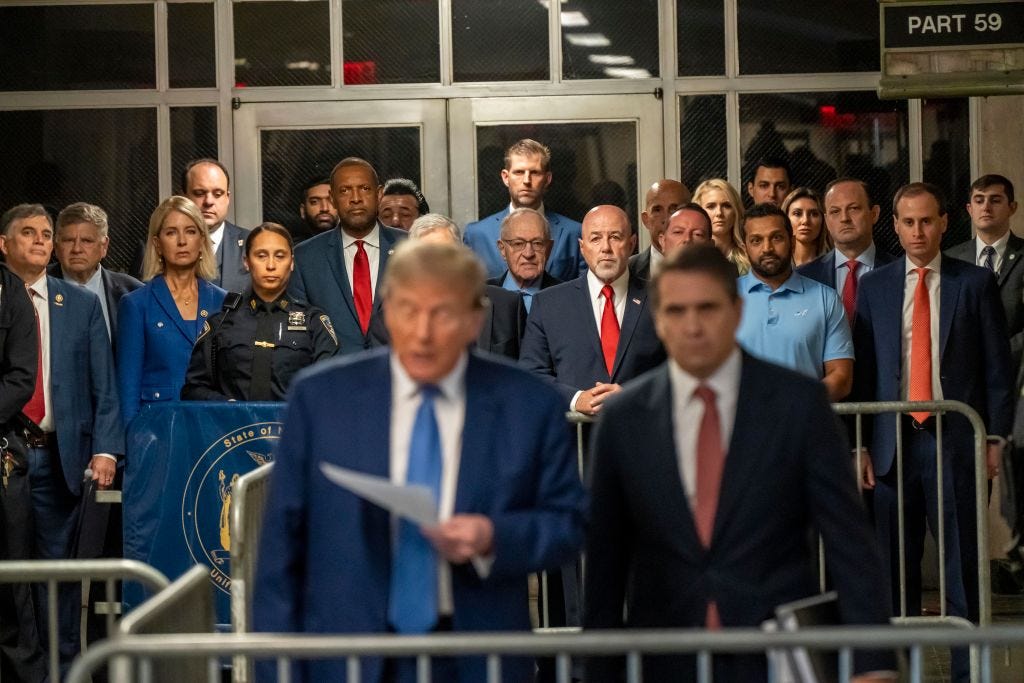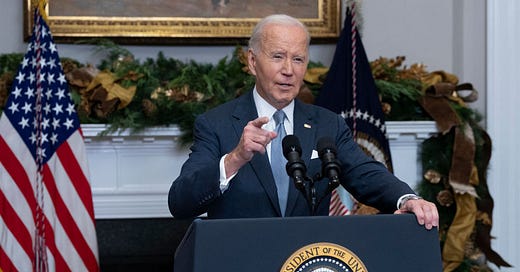
The Free Press

One of the enduring features of American politics until the Trump era was that, as a general rule, the party in power did not warp the justice system to target political opponents. Indeed, the modern president who came closest to abusing the federal government’s vast powers to pursue his enemies, Richard Nixon, was ultimately forced to resign for covering up a scheme to spy on the Democrats in the 1972 election.
But since Trump first ran for president in 2016, both parties have been engaged in a game of chicken when it comes to deploying the justice system against their opposition. The latest salvo in this contest came last week when the news leaked that President Joe Biden is considering issuing blanket pardons for potential targets of the incoming Trump administration. This would include current and former members of Congress like Adam Schiff and Liz Cheney. It would also include current and former officials in the executive branch.
To put it mildly, such a pardon would constitute a massive norm violation. To start, pardons traditionally have been issued for specific crimes where the person has already been convicted and is serving or has served time. There have been exceptions. Gerald Ford pardoned Nixon in 1974 after he resigned and before he was charged with any crimes. As he was about to leave office, Bill Clinton pardoned Marc Rich, a wealthy financier who had fled to Switzerland to avoid prosecution—and whose wife was a major Democratic donor. And earlier this month, of course, Biden pardoned his son Hunter for crimes for which he was convicted “or may have committed or taken part in” between January 1, 2014 and December 1, 2024.
But never in the history of the republic has an entire class of people been pre-pardoned for crimes for which they have not yet been investigated, much less indicted. Such a preemptive pardon not only signals a lack of confidence in the fairness of our justice system; it’s also an invitation for Trump to do the same.
The argument for these preemptive pardons is that the incoming Trump administration has already signaled it is seeking retribution. Trump’s choice to be the next FBI director, Kash Patel, has already said as much on various podcasts. His 2023 book has an appendix that lists various “deep state” officials who have served both parties. New York Times columnist Michelle Goldberg argued last week that the appendix to Patel’s book is a list of people who should receive preemptive pardons.
Not every Democrat agrees. Jake Auchincloss, a congressman from Massachusetts, told NewsNation Sunday that such a preemptive pardon also implied a level of guilt for those who received them. What’s more, the system already allows for other avenues to redress the misrule of the party in power. “If the American people don’t like the thuggery of the justice system under Donald Trump for the next two years,” Auchincloss said, “they should take note and in 2026, they should send Democrats back in control of Congress.”
During the campaign, Trump did talk about retribution, but since the election, he seems to be striking a different tone. In an interview with NBC’s Meet the Press that aired Sunday, he said he would not instruct the Justice Department or FBI to investigate or prosecute his political enemies. But he also didn’t rule it out. “I’m not looking to go back into the past,” he said. “I’m looking to make our country successful. Retribution will be through success.”
There is a context to this talk about a never-before-contemplated blanket pardon. In trying to criminalize their opponents, both parties are stuck in a downward cycle of norm violations. When Donald Trump ran for president the first time in 2016, he campaigned in part by calling for Hillary Clinton to be jailed for her use of a private email server for official, and at times classified, business when she was secretary of state. What presidential candidate in modern times had called for his opponent to go to prison before? That was a norm violation.
Though his supporters loved it—“Lock her up” was a MAGA rallying cry—Trump never followed through on those threats as president. What followed, however, was a meritless FBI probe of alleged collusion between his campaign and Russia—with Democrats like California congressman Adam Schiff cheering them on. Although that investigation got nowhere, it hobbled much of Trump’s first term. And it was kept alive—even after lower-level FBI agents recommended closing the investigation—in part because of false opposition research funded by Hillary Clinton’s 2016 campaign.
Although Russiagate never nabbed Trump, it damaged the lives of several Trump aides, starting with his first national security adviser, Michael Flynn. He was lured into a perjury trap by the deputy FBI director Andrew McCabe, on his first full day on the job, when he was asked about a phone call he made to Russia’s ambassador during the transition. The implication was that Flynn was conspiring to blunt the sanctions the outgoing administration had just imposed. When the actual transcript of that call was declassified in 2020, it did not support the wild theories that Flynn was compromised by the Kremlin. But it came too late to clear Flynn’s name because he had already pleaded guilty to lying to the FBI, a plea he would later retract. Trump pardoned Flynn after a district judge did not allow the Justice Department to drop the case.
The Russiagate investigation represented a massive norm violation for the FBI and Justice Department because it was driven by a partisan desire to hurt the incoming president. But Trump then decided to up the ante on norm violations. After losing the 2020 election, he refused to acknowledge his defeat, even after all of his legal challenges—except for one—failed. In fact, Trump refused to accept his loss even after his attorney general, Bill Barr, and his vice president, Mike Pence, refused to accede to his efforts to block the certification of Biden’s victory. Trump eventually left office, but he had shattered a norm, going back to the founding of the republic, of gracefully accepting the result of the election.
With Trump out of office, it was the Democrats’ turn again to degrade the country’s norms, as they began to explore ways to convict Trump of a crime, any crime, before he could run for reelection. This lawfare strategy had many components. Special Counsel Jack Smith, for example, prosecuted Trump for both efforts to undermine the results of the 2020 election and his retention of classified documents at his personal home in Mar-a-Lago. Trump had lied to the FBI about whether he had state secrets with the personal papers he took from the White House.
Those cases were strong, though they were not a lock. Biden had also taken classified material to his personal home and office when he was a senator and vice president. But a special prosecutor declined to bring charges because Biden himself had shown he had such a poor and addled memory that the prosecutor argued no jury would convict an elderly man with such mental deficiencies. This summer, the Supreme Court ruled that the president had immunity for his “official acts” when he was in office, making Smith’s 2020 election case much harder to win. (Smith is planning to resign before Trump’s inauguration.)
Other examples of lawfare against Trump were far less defensible. In New York, Manhattan district attorney Alvin Bragg invented a new approach to enforcing New York state business records law to put Trump in the crosshairs. At issue was that Trump paid off a porn star and a former Playboy Playmate with hush money that he then reported to the Federal Election Commission as legal fees. Bragg charged this as a felony because Trump’s alleged business records fraud was committed in an effort to subvert the 2016 election. One of the many flaws with this prosecution was that the filings at issue were made after everyone voted. In other words, Bragg claimed that Trump tried to subvert the 2016 election because he didn’t list “hush money” on a federal form that wasn’t filed until 2017. On May 31, a Manhattan jury convicted Trump of 34 felonies, one for every installment of his hush money payments.

This is the context of Patel’s and Trump’s campaign promises of retribution. They argue that their Democratic pursuers should be subjected to the same kind of justice deployed against Trump. And this promise has led Biden to consider an unprecedented blanket pardon for all of those potential targets. And thus the cycle continues. One norm violation leads to the next and the next one after that, and so on.
This is how republics unravel. When one faction justifies violating the rules in anticipation of the other side doing the same, after a while all the old rules that preserved stability, the peaceful transfer of power, and the independence of the justice system will be so degraded as to be meaningless.
If Trump is being sincere that he won’t seek retribution, then he should make sure his nominees for the Justice Department and the FBI are on the same page. In a great twist of fate, it is Trump, who the Democrats have long viewed as a danger to democracy, who is in a position to put an end to the cycle of norm violations and show his supporters—and everyone else—that we remain a country where the rule of law is supreme. When he says he won’t seek retribution, let’s hope he means it.
Eli Lake is a columnist for The Free Press. Follow him on X @EliLake and read his piece, “The Real Hunter Biden Scandal.”
To support independent journalism, subscribe to The Free Press:



